#but also more passive ones like operas after he gave them a chance
Explore tagged Tumblr posts
Text
I think he'd try out a lot of new things just to see what this newborn, autonomous version of himself is even like, what he enjoys when he gets the chance to figure that out for himself. if he’s physically fine, he'd try a lot of water sports like surfing, kitesurfing, swimming, diving, jetskiing etc.
if he's recovering from his injury, i imagine he'd try cooking, baking, fixing things around the house that involves taking things apart and putting them back together, maybe learning chess from Vincenzo, watching operas and theaters...
What hobbies would Hanseo pick up in Pagualizza? Ofc ice skating, but since he’d have a lot of free time (unless he picks up Babel and pulls it from the ground up again), I imagine he’d deffo pick up other hobbies to occupy him
#maybe gardening or managing one of vin's vineyards#he crotchets chayoung a scarf. badly. but she wears it anyway#he intends to learn playing violin but it’s so terrible vincenzo briefly considers hitting him over the head with it:(#he gets a phase where he wants to invent a new ice cream flavour#he learns. idk swedish or sth. after he masters italian#he tries painting but it goes awfully. photographing is more his forte but he lacks the patience for it#vincenzo#jang han seo#he prides himself with making the perfect coffe and the perfect pizza#i think he'd love hands-on hobbies#but also more passive ones like operas after he gave them a chance#and paid more attention to/understood what's even happening on stage#other things that need patience like fishing and photography he'd dislike#he doesn’t particularly enjoy chess either#but he likes playing with vincenzo anyway#just bc of the time they spend together:')#*coffee
8 notes
·
View notes
Text
Shining Light chapter 1: Love, Lust, and Passive-aggressive Chocolates
This is a request for @creepyalienghost, but I really enjoyed making it. There will be at least one other chapter.
“You had something important to ask me, Norman?” Jack asked. Norman had left a note in his locker saying as much, and asking him to meet him in his projector booth after the others had gone for lunch.
“Yes,” Norman replied matter-of-factly. “What is Sammy’s favourite candy?”
Jack looked at him, dumbfounded. “What?”
Norman looked away. “Sorry. You see, I know that Susie has a thing for him, and I wanted to make her day. So, will you help me make her day?"
"Sure, I guess... you aren't actually going to leave her a note, though, right? It would be pretty cruel to convince her that Sammy left her something if he didn't."
"No, I promise. Nothing like that- I'm just going to leave her the candy anonymously. I just thought she'd be happier daydreaming about her secret admirer being the most handsome man in the music department instead of a big creep like me."
"Well, okay, I guess. Sammy's favourite candy is chocolate almonds. But don't tell him I told you that, or he's going to be mad at both of us for stirring up drama. Alright?"
"Alright, thank you. You can go," Norman said gently. That had gone a lot more awkwardly than he'd hoped.
A lot of people in Joey Drew Studios did not like their jobs, but Norman was certainly an exception. Sure, the place oozed with suspicious (though that was a lot less scary when you were a man who knows everything), and it must have sucked to be a creative-type and get yelled at by Mr. Drew for the smallest mistakes (while a non-creative type like him could just keep his head low and fade off the radar), but hey, it paid well, and working the projector wasn’t particularly hard.
The real reason why Norman loved his job, though, was the watching. Moreso than the cartoons they worked on, the music department had enough drama to be its own cartoon lasting several seasons. Susie would have you believe that she went through enough drama to fill several seasons of a soap opera, and Wally had enough mishaps to star in his own sitcom. And staying up in his projector booth where he could see them was free entertainment.
There was another man, too, whom Norman loved to watch- a supporting player in the shenanigans of the other two- Sammy Lawrence. The reason why was obvious- Sammy Lawrence was gorgeous. He was like a shining prince- all light colours from his pale skin, icy eyes, and blond hair. He was slender and graceful, and with those sharp, clean facial features... Norman couldn’t really help himself but to stare. Sammy has caught him looking a few times, and given him this sharp, disgusted look. Though, maybe that was just how he looked at everyone. It was a pity that such beauty had to be wasted on someone so sour.
It was probably a good thing that the chances of Sammy ever looking at him that way were tiny. Still, this crush was annoying as hell, and Norman hoped that once he'd given into it once, it would be at least somewhat out of his system.
The next day, Norman arrived to work early. He hung the decorative little cloth bag of chocolate almonds on the door to Sammy's office. Then he went to the break room to read a book until it was time to get to work. This really was ridiculous. But he'd stop after this. That day in his projector booth, he saw Sammy approaching Susie with the bag of candy, graceful and adorably hopeful. My, if Susie had lied, then that would have made them both happy, and Norman would have something beautiful to watch for God knows how long. But by the disappointed look on Sammy's face, she hadn't. Sammy pocketed the candy and got in position to start up the band. Norman started up the projector. Once it was time to break for lunch, Norman saw Sammy go over to the next possible secret admirer: Jack.
Blood drained from Norman's face. Well, he was caught. Okay. He supposed it would probably be best to leave quickly and have lunch somewhere aside from the studio. Thankfully, all music room drama tended to be short-lived- in a couple of days, Wally would do something crazy and then this would be forgotten.
Surprisingly, the afternoon passed without anyone passing Norman so much as a mean look. Maybe this wouldn't be a big deal after all.
The next morning, Norman found a bag of chocolates tied to the doorknob of his projector booth. The bag was light pink instead of the green one his gift to Sammy had been wrapped in, so he knew it wasn't the same gift. Opening the bag, he also found a note that read, Stop being a creep, and maybe I'll consider it.
Norman was didn't know what to make of it. After the initial shock wore off, he got angry. As though he actually wanted Sammy as anything other than a fantasy. During lunch hour that day, Norman went out to get some chocolates and return Sammy's favour, this time adding a note that read, Stop being a jerk, and maybe I'll consider it.
At the end of the day as everyone was leaving, Sammy caught Norman's arm and said, "hey, maybe let's actually talk instead of sending each other passive-aggressive chocolates?"
"Sure," Norman said. Sammy led Norman into one of the spare rooms.
"So, you're interested in me?" Sammy asked simply.
"You're handsome," Norman said. "And graceful, and charming when you want to be. You’re also kind of a jerk. You yell at everyone. You yell at Wally when he messes up. You yell at Jack when he tells you to take it easy. You yell at anyone who happens to be around when you're running late for a deadline. You yell at me when you catch me watching you."
Sammy had been rolling his eyes until Norman got to that last part. "That's what anyone would do, you weirdo!"
There was a moment of awkward silence as the two men stared at each other. "Oh," Norman said. "So, back to the point, are you interested in me?"
Sammy didn't meet Norman's eyes. Really, he found Norman to be very attractive, in a rugged way, and mysterious. He probably knew so much, and he looked awfully strong. It's something Sammy had noticed about him months ago. But Sammy couldn't say that. "Sort of," he pouted.
"How's about if I don't catch you yelling at anyone until Friday, and you don't catch me following anyone around, we try it?"
Sammy smiled wryly. "That is a good idea. Though, if I'm going to have to keep my cool for three whole days, I'm going to need to know what my reward is." At this point, Sammy was moving towards Norman. He placed a hand on his chest. Norman froze up- were things actually going the direction he thought they were? Before he knew it, Sammy's lips were on his. Determined to take this moment in, Norman ran his fingers through Sammy’s hair.
Then, the door opened. “Ah knew I’d-“ came Wally’s voice, cutting off as he realized what he’d walked in on. Sammy turned to him angrily. Wally gave a sheepish smile. “-left my jacket in here somewhere... just lemme...” Wally began slinking towards his jacket on the floor. Sammy took a deep breath, then picked it up for him.
“I’m not going to blow up at you, Wally. But please, don’t tell anyone about this, alright?”
Of course, Sammy knew full well that by this time tomorrow, everyone would know about it- no one gossiped like Wally. But that kiss was worth it. He gave a still-bewildered Norman one last look before leaving.
37 notes
·
View notes
Text
"CAMILLE" (1936) Review

"CAMILLE" (1936) Review I am about to confess to something many might regard as sacrilegious. I have never regarded Greta Garbo as one of my favorite actresses from the Golden Age of Hollywood. I had nothing against her . . . personally. But I realized that I could barely recall any of her movies that were personal favorites of mine. Because of this, I was very reluctant to do a re-watch of one of Garbo's most famous films, "CAMILLE".
Produced by Irving Thalberg and directed by George Cukor, "CAMILLE" is based upon the 1848 novel and 1852 play "La Dame aux Camélias" ("The Lady with the Camellias") by Alexandre Dumas, fils. The movie told the story of Marguerite Gautier, a woman of low-class birth who rose to become one of Paris' top courtesans. Debt-ridden from helping friends and suffering from tuberculosis, Marguerite hopes to attract the attention of an aristocrat named Baron de Varville as her next "client" at the opera. However, just as she manages to attract the Baron's attention, Marguerite meets a young member of the bourgeois gentry named Armand Duval and instant attraction flares up between them. The attraction eventually develops into love. But external influences - including Marguerite's debts - threatens their potential for happiness. I have not seen "CAMILLE" in a long time. A long time. There is a good chance I have not seen it since I was in my early twenties. But something . . . I have no idea what . . . led me to watch this film after so many years. In the end, the only regret that I managed to feel was that I had ignored this movie for so long. Did I have any problems with "CAMILLE"? Perhaps a few. I noticed that the movie's narrative began in 1847 and ended roughly a year later. I think. Considering the story's setting, I found it surprising that the narrative never touched upon the political upheavals that swept throughout Europe between early 1848 and early 1849. In France, the upheaval was known as the French Revolution of 1848. During this event, the French king Louis Philippe I was overthrown in February 1848. Four months later, many Parisian workers had unsuccessfully risen in insurrection against the conservative Second Republic government. I realize that "CAMILLE" is not a political movie. But considering the film's setting and the fact that one character had plans for a diplomatic career (Armand Duval) and another was a wealthy aristocrat (Baron de Varville), I found odd that the topic of political upheaval was never touched upon. I also had mixed feelings about the costumes created by legendary Hollywood designer, Adrian. I realize that the man had a reputation for creating some of Hollywood's most memorable and famous costumes. But . . . I do not know. Oh, yes I do. I think Adrian should have stuck to modern day costumes. His period costumes were not bad. Some of them have actually impressed me. A good example would be this particular costume from "CAMILLE" - namely Marguerite's dark velvet riding habit:
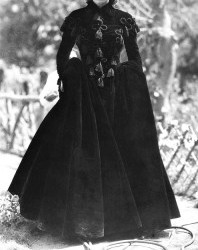
I also admired how Adrian managed to re-capture the fashion for men during the 1840s:
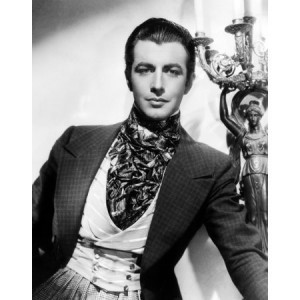
On the other hand, I had problems with some of the gowns worn by Greta Garbo, like the one shown in the image below:
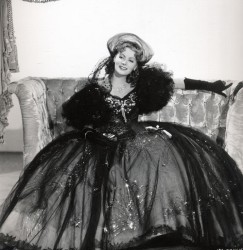
I was inclined to complain about the sequins featured in the costumes, but I discovered that they had been worn as part of fashion for thousands of years - including the 19th century. But I have other problems with the above costumes. One, they looked as if they came from some cheap costume warehouse. And two, Garbo looked as if she was about to be consumed by the voluminous amount of material used to create those gowns. Or could it be that Garbo lacked the figure for the fashions of the mid 19th-century? No . . . I do not believe that is a good excuse. I am certain that Western women of the 1840s came in different shapes and sizes as they do today. It is possible that Adrian had simply failed to design Garbo's costumes in a way that would fit her perfectly. As a high-priced courtesan, Marguerite Gautier had the funds to purchase a wardrobe filled with clothes tailored to fit her. I do not think that Adrian took the time to fit Garbo's costumes. Or perhaps she did not give him the time. Otherwise, I cannot think of any other complaints about "CAMILLE". If I must be brutally honest, I think it is one of the best love stories I have ever seen in a motion picture, hands down. Ever. I was surprised that Alexandre Dumas fils, the son of the man who had written classics such as "The Three Musketeers" and "The Count of Monte Cristo", had written "La Dame aux Camélias" when he was roughly 23 years old. And screenwriters James Hilton, Zoë Akins and Frances Marion did a superb job in adapting Dumas' story. "CAMILLE" could have easily developed into one of those sappy love stories in which only external forces stood in the lovers' way. And yes, Dumas' tale featured those "forces" that stood in the way of Marguerite and Armand's relationship - Baron Varville, Marguerite's bank account, her friends and Armand's father. But there were other forces in play. Namely, Marguerite and Armand. Between her passive aggressive personality, penchant for evading the truth and an inability to handle her finances; Marguerite had put herself into a situation that made it nearly impossible to have a genuine romance with Armand, let alone anyone. And poor Armand. I could say that he was completely faultless in this romance. But he was not. Armand was naive, hot-tempered, rash and a bit too stubborn and proud for his own good. Considering the state of her health, I do not believe Marguerite's romance with Armand was destined to last very long. However, I feel that it were not for their personal flaws, the pair could have enjoyed more time together than they actually had. Many still regard Greta Garbo's performance as Marguerite Gautier as her finest performance. As I had hinted earlier in this review, I have only seen less than a handful of Garbo's movies. But I cannot deny that she gave a brilliant performance as the cynical, yet warm-hearted courtesan. Although Garbo was a healthy looking woman most of her life, I do admire how she utilized body language and facial expressions to convey Marguerite's questionable health and languid lifestyle. I have always suspected that Robert Taylor was one of the most underrated actors in Hollywood history. He had been in Hollywood for two years by the time he shot "CAMILLE". Many critics tend to focus on Garbo's performance when discussing the movie. As I had pointed out, she gave a superb performance. But so did Taylor, as Armand. He did an excellent job in conveying Armand's character from a very naive young man to someone who is a bit more cynical and mature. And yet, Taylor made sure to retain Armand's temper and stubbornness. Another excellent performance came from Henry Daniell, who portrayed Marguerite's "client", Baron Varville. Daniell not only skillfully conveyed Varville's cool and arrogant nature, but also the character's slight infatuation with Marguerite and the pain he experienced in facing the reality of Marguerite's true feelings for him. Laura Hope Crewes, famous for her role in the 1939 Best Picture winner, "GONE WITH THE WIND", gave a very entertaining performance as one of Marguerite's closest friends, a veteran courtesan named Prudence Duvernoy. It is a shame that Crewes never earned an Oscar nomination for her performance. Her Prudence is a skillful mixture of friendly warmth and a mercenary nature. "CAMILLE" also featured first-rate performances from the likes of Lionel Barrymore, Rex O'Malley, Leonore Ulric, Jessie Ralph and Elizabeth Allan. I was astounded to learn that "CAMILLE" had earned only one Academy Award nomination - Greta Garbo for Best Actress. And she lost to Luise Rainer's performance in "THE GREAT ZIEGFELD" . . . much to the surprise of the Hollywood community. Hell, I am not only shocked that "THE GREAT ZIEGFELD" had also won Best Picture, I am flabbergasted that "CAMILLE" did not even earn a Best Picture nomination, along with nominations for the leading actor, a screenplay nomination or a Best Direction nod for George Cukor. How did this travesty happen? A superb movie like "CAMILLE"? The discovery of the limited amount of acclaim that "CAMILLE" had earned back in late 1936/1937 really convinced me how irrelevant that the Academy Awards truly are. Thankfully, movie fans still have the movie to enjoy for years to come, thanks to George Cukor's superb direction; a great screenplay by the likes of James Hilton, Zoë Akins and the legendary Frances Marion; and a superb cast led by the iconic Greta Garbo and the excellent Robert Taylor.
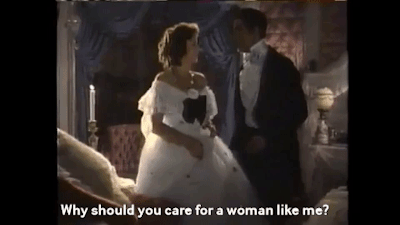
#la dame aux camélias#camille#camille 1936#alexandre dumas#george cukor#james hilton#zoe atkins#frances marion#irving thalberg#greta garbo#robert taylor#Henry Daniell#rex o'malley#laura hope crews#jessie ralph#lionel barrymore#elizabeth allan#leonore ulric#old hollywood#golden age of hollywood#period drama#costume drama#july monarchy
3 notes
·
View notes
Text
Shadowhunters 3x19 Review
I wasn’t planning on doing a review, but this episode was very frustrating to me so here I am. Warning for spoilers and bitterness.
I love Becky! She’s sooo cute! I wish we’d gotten to see more of her. I loved her dynamic with Simon, but I didn’t like how she was used to push S*zzy. It just didn’t work for me.
I don’t get it tho, she and her mom had been in Florida for how long? Two weeks? Three? And then she came back for trick or treat? That was kind of weird.
This whole thing made me think, though. Simon can become a mundane again now, right? So why doesn’t he? I mean, I’m sure he likes being able to run super fast, but I would guess being with his family and not watching them die one by one would be more important to him. And yes, that includes the kids he would have with Izzy and Izzy herself.
Ugh, we get it, Clary is SUPER DUPER special. She’s not like other girls or other Shadowhunters. Y’all don’t have to rub it in our faces every chance you get. Honestly, the more they’re trying to get me to root for Clary, the less I do. She’s just so annoying most of the time and so is everyone’s weird obsession with her. What’s so special about her anyway? She’s just an annoying entitled girl who can’t keep her nose out of everyone else’s business.
“I used to be one of these idiots” shut up. Don’t talk. Ever.
I hate this storyline they gave Magnus. It makes him look like some insecure, passive crybaby and it got annoying after the first episode. I get that’s kind of the point, but I feel like it would have been better for us to see him staying in hell and “working” with Asmodeus as it not only would have given us an insight into a different aspect of his character, but also an insight into a totally unfamiliar dimension.
I love the monotone voice Alec has while talking to Magnus. #sarcasm. Aaand now he lied to his boyfriend AGAIN. So romantic.
What the fuck was up with that channeling session had anyway? If this was possible why did Clary and Jace bother summoning Lilith and exposing themselves to the risk of having a greater demon on the streets of NYC? I guess it didn’t even matter since Asmodeus managed to find a loophole...and now there are TWO greater demons in NYC...Great
Speaking of which...why is no one worried about Lilith just hanging out in NYC freely and with her stepson/boy toy at that? You’d think that would be more important than Clary’s bond with Jon, especially considering the fact he’s in custody.
“Break his heart to save his life” Am I watching the wrong show? Because I’m pretty sure I’ve seen that exact same plot on like every soap opera that exists. This is ridiculous. I would have been more okay with it if Asmodeus did it, because he thought Magnus would never be a priority for Alec (which is true) and because he realizes the two of them are so different that it’s bound to end up in flames, but nooooo it has to be because Alec makes Magnus weak. Like, what does that even mean?
Why do we always have to have a big break up/fight between Magnus and Alec? Why couldn’t they have lied to Asmodeus and worked together to defeat him? Call me crazy, but seeing them work together as a united, lving couple would have been far more interesting than seen them walk away dramatically from one another.
YAAAY, Luke is back...but it’s only to make sure we know how special and amazing Clary is in case anyone forgot.
Yeah...I couldn’t give any less of a damn about that dark bond story. They should have made the story with Glorious the main one, the one that all the others revolve around, instead of having it only for 3 episodes. It would have been more interesting.
Why can’t Jace and Alec talk about something that isn’t their significant others? I mean, considering everything they’d both been through I would guess there would be other topics for them to discuss besides the people they put their penises in.
The break up scene was underwhelming. That is all.
Magnus talking to Maryse was cringe. Like, I get it she’s excited to have a BBC and wants to talk about it, but I mean...does it have to be with Magnus?
I has really this super warrior, who is also an abuse victim, been reduced to a love stuck puppy and a therapist too everyone else, despite the fact that he’s very much traumatized as well?
Like I said, this was a very weak episode for me. Not nearly as spooky and excited as I thought it would be. Filled with plotholes. I will say they’re making it very easy for me to let go of SH as a show with these weak episodes and disregard for anything but the ships
4 notes
·
View notes
Text
A Perfectly Crafted Society
What was the last song you listened to or movie you watched? Did your mind predict the rhythm of the entire song from just the first few notes? Did you expect the ending of the movie before it was over? More importantly, were you satisfied when the beat continued, or the hero triumphed? How would you have felt if the chorus suddenly changed mid-tune or the protagonist ended up dying a disgraceful death? Would you turn off the radio in disgust or walked out the theater feeling your money was wasted? Theodor Adorno, a German philosopher and composer, would argue the vast majority would experience those feelings of exasperation. Why? Because our society has conditioned us to expect and enjoy the predictability that is pervasive in so much of our lives. Adorno spent his life characterizing the unseen gears that rotate our society, and by analyzing his life and works, we can see if those gears are still in motion today.
From a very young age, Theodor Adorno had an intimate relationship with music. His mother was a talented singer, and Adorno himself learned to play Beethoven pieces at only twelve years old. Known for his philosophical contributions, Adorno was also a passionate composer and musical scholar all his life, and simultaneously taught philosophy and music in the years leading up to his death. When he was thirty-one, he was exiled from the increasingly Nazi Germany due to his Jewish heritage, and so began Adorno’s relocation to America and his first touch by the clammy hands of western culture. Perhaps one of his most illustrative encounters was when he was offered to help conduct a research project into the rising impact of radio music. Adorno thought the information the project gathered was being used as a vehicle to philosophically explore the shifting landscape of America, but instead, was greeted with the fact that it was to see if listeners could be targeted with specific stations based on their likes and dislikes. Adorno was shocked and disgusted by the culture that attempted to so blatantly quantify and predict its member’s behaviors. And yet, this incident, he began to notice, was just one finger of a gloomy fog that hung over the entire country. He noticed that “culture today is infecting everything with sameness,” and gave the name to the body propagating such uniformity as “the culture industry.” He loathed the nationalist regime of his home country and anxiously discerned many parallels between fascist Germany and capitalist America. Adorno saw an industry that sought to promote conformity and distractions as a means to control its consumers and to hide its true motives under the guise of an intricate reward and punishment system. But what might be the most worrying is that the culture that Adorno perceived more than 50 years ago might still be among us.
When we look at our car, or phone, or clothes, or house we feel connected to these objects since we feel we chose the models that are unique to us. Just look at the pockets of society that have erupted who are fiercely attached to their Ferrari or claw at anyone who claims a Samsung is better than an iPhone(it is). But actually how different are these products from each other? Adorno argues that the sameness that permeates the mass-marketed commodities of our world is hiding under the very guise of these different products. He says that “the mechanically differentiated products are ultimately all the same. That the difference between the models of Chrysler and General Motors is fundamentally illusory is known by any child, who is fascinated by that very difference.” And you just have to take a look at the Greek life on this campus to confirm this statement. Each frat claims its own distinctive sets of features, and the continuous competition of frats seems to indicate that ideological opposites exist among them. And yet, like the difference between one phone and another, only the surface is different while the internals remain the same. Adorno also notices this in “hit songs, stars, and soap operas,” observing how they “conform to types recurring cyclically as rigid invariants.” Furthermore, he extends this to say “Films and radio no longer need to present themselves as art. The truth that they are nothing but business is used as an ideology to legitimize the trash they intentionally produce.” This is profoundly prophetic as we have reached a point where we will mentally ingest whatever we see on the screen even if it is plainly a cash grab or marketing ploy. Nowadays, movies will use product placement in scenes even if it shatters the viewer’s sense of illusion. Artists will shamelessly create a piece specifically for the advertising of a company’s products, and people won’t even blink an eye. As Adorno writes, those in power no longer “take much trouble to conceal the structure” of the culture industry because we have become so accustomed to the continuous similarities of media formulated for profit. A profit that is well guarded by an elaborate honor system.
Adorno recognized a subtle but powerful reward and punishment system that helps sustain the culture industry even today. For example, it is highly unlikely that if you’re reading this paper, you are not in, or have not gone to, college. Our society sells college with the vigor of any good salesman, claiming it will lead to future financial freedom and stability. And they’re right...but only because it was designed that way. As Adorno writes, gaining specialist knowledge, like what college and graduate school give you, “is a feature of the irrationally systematic nature of this society that it reproduces, passably, only the lives of its loyal members.” Essentially this means that it’s a mechanism of rewarding those who play by the rules our culture has laid out. But what about someone who deviates from this path? Well, they’ll lose access to money and will be unable to find a job, and most importantly they’ll be seen as “an outsider,” and an outsider, per the culture industry, is “the gravest guilt.” This is especially true now, where we are taught from a very young age to avoid the unemployed and uneducated, to ignore them in the secret hope they’ll disappear. It’s incredibly telling how hard it is for people to make eye contact with the homeless, or how often people disregard the opinions of the uneducated. Even those who fail to fulfill less critical societal obligations like marriage or kids are subtly ostracized in our world. Adorno even realizes that in movies people who don’t check of these societal boxes are “at best, an eccentric, an object of maliciously indulgent humor; but mostly he is a villain and is identified as such.” In this way, the culture industry can continue to self-propagate itself by elevating those who align themselves with its values and crush those who don’t.
One of Adorno’s most poignant understandings was the dangerous relationship between our culture and entertainment. As Adorno puts it, “the culture industry remains the entertainment business. Its control of consumers is mediated by entertainment.” Like a child fascinated with the bright colors of a lollipop, we are fascinated with the dazzling lights of the entertainment that constantly surround us. It is a mechanism those in charge use to ensure that we are looking the other way, that we are always “putting things out of mind, forgetting suffering, even when it is on display.” The birth of the cell phone has only accelerated this agenda as now you are never without an object to distract you from reality. I have noticed that the instant anyone becomes uncomfortable they will pull out their phone lest they have to confront their unpleasant situation. Or how about the millions who come home after work and watch television to prevent themselves from thinking about the endless treadmill their life has become as a result of our culture? Adorno took this one step further and added that entertainment “is sought by those who want to escape the mechanized labor process so that they can cope with it again.” In colleges across the country, this couldn’t be further from the truth, where people party and get wasted to at least be able to walk lifelessly through their classes. But it’s not simply the “escape from bad reality,” instead, it’s an escape from “the last thought of resisting that reality.” And this is an important distinction. Because finding a way to cope with the undoubtedly depressing aspects of life is critical and necessary. But preventing yourself from reflecting how to actively resist and help change that reality is how those in power seek to keep us passive and compliant. We don’t use entertainment just to cope with reality, we use it to ignore reality, and hence, we continue to keep ourselves under the foot of the culture industry.
The culture industry has one more knife to sharpen the shackles that keep us bound and obedient: chance. Adorno studied the role of chance in society and wrote that “it serves as an alibi, giving the impression that the web of transactions and measures into which life has been transformed still leaves room for spontaneous, immediate relationships between human beings.” He argues that chance is used by those in control to give an appearance that life is not as rigid as the culture industry has made it. If you turn to the present, this can be seen in the form of game shows, cruize prizes, lotteries and many more events that help showcase how luck meets the everyday. When you see a contestant win a couple of thousand dollars or someone in your state winning the lottery, you can’t help but feel that the extraordinary can happen to the ordinary, and maybe that ordinary could be you. And yet it won’t be you, and the culture industry knows that. As Adorno writes “it is so minimal for each individual that it is best to write it off at once and rejoice in the good fortune of someone else, who might just as well be oneself but never is.” In our society, people are delighted when someone just like them spins a wheel and becomes a millionaire, even though their own monotonous life has not changed in any way. I can’t tell you how many of my friends invest in bitcoin just to hope for a chance to make it big, to break the chains that tether them to the tedium of going to class or getting a job. And yet they won’t make it but the longer they think they will, the longer they’ll stay on the relentlessly chugging train of the culture industry.
Theodor Adorno had to deal with a manipulative and fascist Germany that exiled him from his home country. And yet, when coming to America, instead of finding a window overlooking an individualistic society, he found a mirror that reflected the culture of his previous home, a culture that was now concealed by the booming voice of capitalism. Adorno recognized the uniformity that arose in a country driven by mass-marketed products and media. He observed the rewards to those who remained compliant and the punishing of those who didn’t. And what especially worried him was the use of entertainment and chance to control the members of the proclaimed culture industry. But what’s worse is that by exploring his writings it is now apparent that this culture industry has only grown larger in our time. From cellphones to pop stars, and game shows to frats, our society is the living embodiment of Adorno’s concerns. And unless you drag yourself to shore the tides of the culture industry will pull you in until all that surrounds you is a perfectly colored ocean of sameness.
1 note
·
View note
Text
The months they go so fast, and May disappeared in a whirl of outwith the norm events. What with many comings and goings, a whole week in Cumbria and more train journeys than I’d really like to make in a month, I’ve made it to June more battered and broken than when I started.

I’ll be honest, I don’t really know what to put in here regarding the news. Brexit is a nightmare, Trump is no better, and News the world over is just miserable. So I think I’ll go with something that hit home for me.
My heart broke when I read about the sinking of the tourist boat on the Danube in Hungary. It is all the more heart wrenching as the wounds scored into the psyche of the nation as a result of the Sewol tragedy are still smarting. This has been close to the bone.
It also made me afraid. Afraid that I might know someone on that boat. True, the chances were slim, but I have met so many Koreans who have made clear their wishes to travel abroad, and many of them since have. I didn’t want any of my friends to be on the boat.
I hope that recovery operations in Hungary are swifter than they were for Sewol, and I hope everyone is found.

I’ve mentioned this book in the up-coming Reading Nook post, but it’s that good that I’m putting it here as well!
If you’re fascinated by Jack the Ripper, this isn’t necessarily a shoe-in. If you are fascinated by Victorian London in general, then this is a perfect read.
Hallie Rubenhold has clearly researched into every nook and cranny, digging up every little tit-bit of information relating to Jack the Ripper’s victims, and gives them their names and lives, immortalising them – Polly, Annie, Elizabeth, Catherine and Mary Kelly – as more than victims, as more than the prostitutes they were always assumed to be.
It’s a heart wrenching read and, and it’s very core, highlights without even having to put into words, how similar women’s situations are now. It is still an automatic assumption that a woman has fallen, that she is lesser, that she is sex worker, if she is in any way perceived to have “fallen” below society’s standards.
We have a long way to go.

I’ve still been slowly making my way through bones, and in the BF’s week of ill, a lot of of the Netflix shows were consumed. I’m now very used to the background noise of people being beaten to a pulp. That or football…
Some of the shows are great, some seem to just dole out the violence for violence’s sake, but as I’ve mostly been passively watching. The roster has been made up of Luke Cage, The Punisher and Daredevil. Luke Cage appears to have a stellar OST, and Daredevil has it’s captivating moments, but The Punisher does nothing for me!
I think we’re nearly at the end now, so hopefully there will be something less noisily violent gracing our TV screens.

More Marvel, this time Endgame.
I know I’m going to get some flack for this, but though I’m satisfied with the ending, the getting there was less gratifying. I could have done with film about half the length, or at least sped up, and I got so frustrated that I nearly left.
I am still deeply unimpressed with how a couple of the characters were dealt with; whilst I understand the point of the exercise, I feel it was handled badly and it left a sour taste. Man it’s hard to write an opinion piece on a movie you don’t want to spoil.
Whilst I would recommend seeing it, because… Endgame, I can’t sit here and say it’s going to blow your mind. It rounds out the Infinity Saga nicely, and sets up the next chapter. I’m going to miss this generation of Marvel, but I believe that what’s coming will be fantastic.

Those in the know are more than aware that I’m not remotely fussy about music genre, I will listen to anything and everything that sings to me. They will also know that I love me a good K-Pop release. What they might not know, is that of some of my favourite Korean artists, the Japanese releases outweigh the success of their Korean ones.
In May, we were treated to Seventeen’s newest Japanese release, Happy Ending. I’ve been disappointed In Seventeen’s recent Korean releases, they’ve just not quite been there. Happy Ending happily bucks this trend.
It’s a treat, being able to consume music from one group in two different national markets. Whilst there are Korean rock groups, and excellent ones at that, you will generally find this sound is more readily accepted in Japan than in Korea.

May has been changeable, weather-wise, and there has been much need for an interim jacket. I’ve not had the greatest of need for one before now – both Hong Kong and Korea are not known for their prolonged seasonal transitions. This year I acquired a second-hand Burberry trench coat that isn’t an colour of cream/beige that makes me look sick, and I have been rocking it (if I do say so myself). It’s a fast way to lift an outfit into something a little more put together.
I was rained upon immediately after this photo, however. The sunnies are a complete and utter lie. Oh, London weather! And now we’re in June and it’s chucking it down outside – a classic British summer. Why did I come back again?
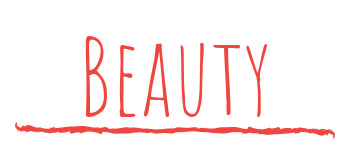
Given this guy a wash, so he’s a wee bit damp!
This months revelation is not a product, but a tool! I have been into sponges for a million-and-one years, and for some reason, in recent months they’ve not been doing the job for me. Personally, I’m going to put that down to my Korean stash has finally run out and those on offer in the UK just aren’t up to par (and no, I’m not going to pay silly money for a sponge).
In light of this, I turned to the make up brushes, picked one that looked like it might be halfway decent for foundation, and gave it a whirl. I haven’t looked back since. Who knows why something that hasn’t worked before is working now, but it does and I’m loving it.

As I slowly march through the endless collection of recipes at my disposal, there have been two of note this may:
On the right we have a smokey pork and black bean recipe from BBC Good Food, technically a taco recipe that instead had with salad to make a frankensteined buritto bowl. On the left we have a gluten free bread recipe from one of the plethora of LEON books I have. If you’re interested in them, I recommend keeping an eye on kindle prices!
The frankensteined burrito bowl was a huge success, and I enjoyed it for many a packed lunch – I packed my salad and meat separately, heated the meat at work and threw it all together with a smidge of cheese and a dollop of soured cream (technical terms there).
The bread, though no unsuccessful, was odd. It’s gluten free, it was always going to be odd. It looked more cakey than any bread I’ve ever come across, but was also dense, without being heavy. I found this bread to be very enjoyable, just as long as you are of the full understanding that it is not, nor is it ever going to be, regular bread!

Stunning photo, I believe from the press performance
The boy and I managed to get tickets to see English National Opera’s production of Faust, at their home in Covent Garden. The Opera House is a stunning mixture of sleek modernity in the foyer/bar and old fashioned opulence in the theatre itself, right down to the patrons; there were some tail coats spotted, and one lady in the most fabulous, sparking red dress. Opera attendance aspirations right there!
Faust (the French version by Charles Gounod, at least I think so!) was long, funny, long some more, rousing, opulent, disturbing and a spectacle. Méphistophélès appearance in the second half (end of Act IV or beginning of Act V, I’ll be honest I’m not sure, all the Act’s melted into one) was fabulous; the scene stealer of the evening.
After the opera, we (one of our friends was in the production) headed off to China town for a bite to eat, and had this amazing aubergine number that I can’t for the life of me remember the name or make up of. Let this post serve as a reminder to the boy that we need to go have that again (a test to see if he reads the blog, perhaps…)

This month, the best place I have been is the Garden up in Cumbria. Getting through May felt like a war of attrition. There were highs and there were really, really dark lows. Being able to get home was a saving grace, and I was lucky enough to be able to experience some amazing weather. Here’s a wee photo of Colin the pheasant strutting about like he owns the place, to a stunning back drop. Who needs filters when you live in the countryside!

2019 has been a good year for the family. My nephew (hereafter nephew the first) arrived in January, and he is the spitting image of my brother, so much so it’s hilarious. In May, another member of the family arrived, another wee lad, to my cousin. It’s far too convoluted to go through the whole relation nomenclature rigmarole, so I’m just going to stick with nephew the second. He is adorable, with So. Much. Hair (quite unlike nephew the first, who is so blonde he looks bald), and I’m so damn proud of my cousin I could cry. I mean I will, I’m a crier. I can’t wait to go meet the wee lad and get in some of those baby cuddles!
Re-Cap:
So May wasn’t all bad, despite the low parts of the month. I got some in some solid hours at home, we gained another new addition to the family, the boy and I got a wee trip tp the opera and he got to enjoy some of my food aspiration experiments (though apparently not enough, according to him, which is difficult when he’s more of a savory guy and I am all about that baking!)
Here’s hoping that June is a great month for all of us!
If you would like to support TGT, head over to my Kofi:

Last Month Today | May 2019 The months they go so fast, and May disappeared in a whirl of outwith the norm events.
0 notes
Photo


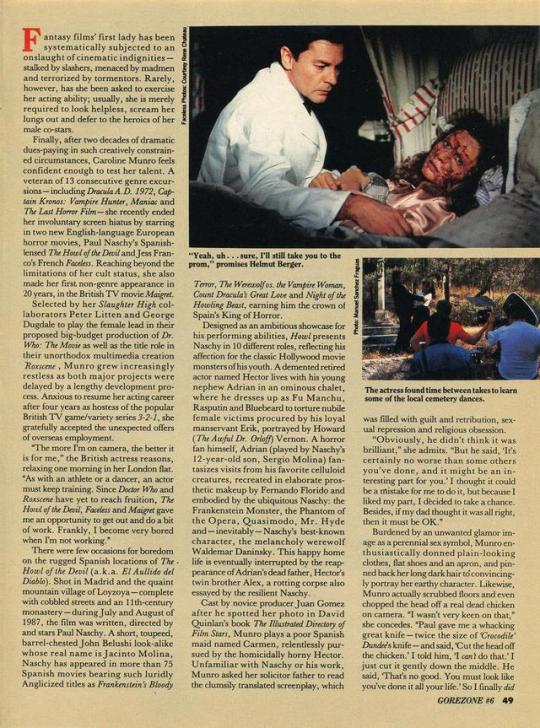

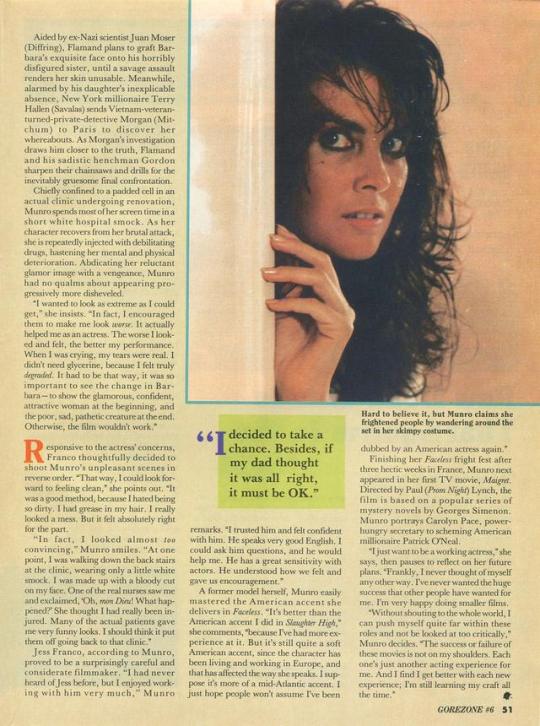

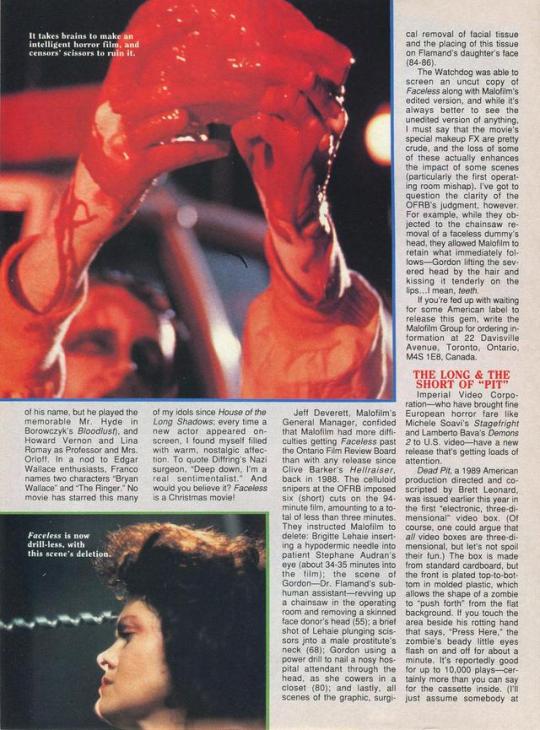
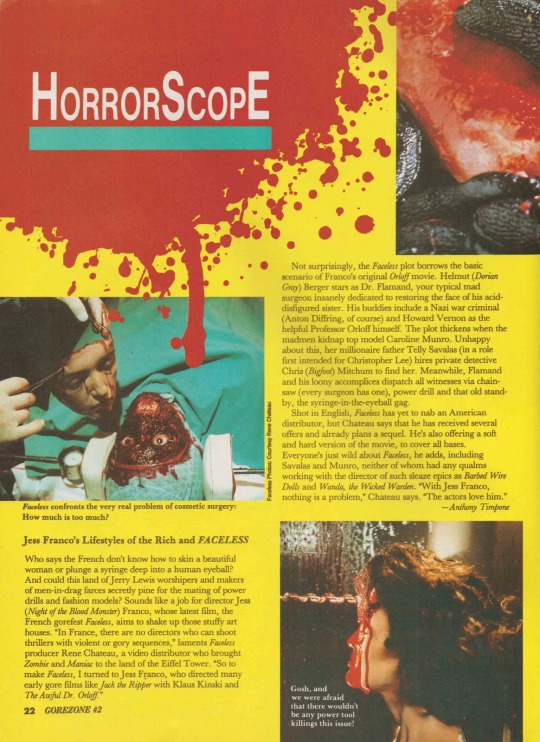
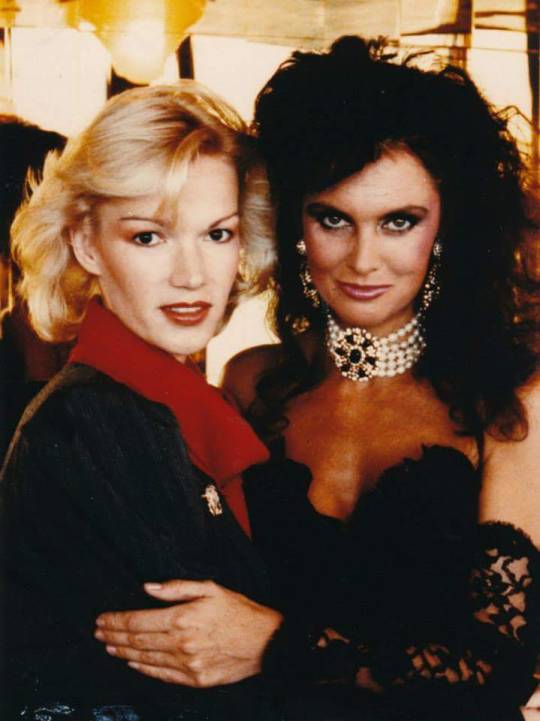
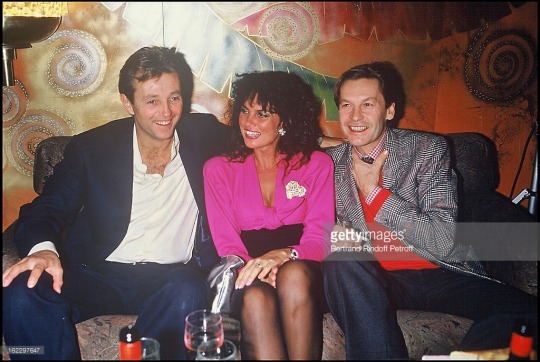
#FlashbackFriday to Jess Franco’s Faceless/Gorezone Issue 6
Toward the end of the decade of decadence (aka the 80s) exploitation auteur Jess Franco attempted to break into the commercial horror market. Faceless is the most notable production, with a cast that brings together ex-porn actress (and Jean Rollin regular) Brigitte Lahaie, British genre icon Caroline Munro, German character actor Anton Diffring, Luchino Visconti muse Helmut Berger, and seventies US TV and film superstar, Telly Savalas! Although still a low budget affair, this Rene Chateau production does offer a slick and glamourous look, unlike anything typically seen in a Jess Franco production.
Dr Frank Flamand (Helmut Berger) runs a posh clinic that specialises in expensive beauty treatments and quack "youth-enhancing" therapies for the excessively rich and vain. What his pampered clients do not know though is that many of their treatments are developed at the expense of kidnapped experimental subjects who are kept prisoner in the soundproof padded cells behind a locked door deep within the labyrinthine corridors of the clinic!
When a dissatisfied patient (who was horribly scarred during bungled plastic surgery) attempts to gain revenge by throwing acid in Flamand's face, she instead hits his beautiful sister, Ingrid (Christiane Jean) and badly disfigures her. Flamand vows to restore the beauty of his beloved sister and, together with his ice-cold assistant (and lover) Nathalie (Brigitte Lahaie), organises the kidnapping of coke-addicted model Barbara Hallen (Caroline Munro) with the intention of using her in a new face-transplant operation he intends to develop for his sisters benefit. Barbara is the daughter of wealthy industrialist Terry Hallen (Telly Savalas) and after his daughter's disappearance, Hallen hires American private detective Sam Morgan (Chris Mitchum) to find her. Meanwhile, Flamand and Nathalie consult Dr. Karl Heinz Mozer (Anton Diffring), an ex-Nazi associate of Flamand's mentor Dr Orloff (Howard Vernon), and employ him to help them experiment on more kidnapped victims in their attempts to perfect the complicated operation.
Gorezone Issue 6: Caroline Does Splatter by Steve Swires
Fantasy films’ first lady has been systematically subjected to an onslaught of cinematic indignities — stalked by slashers, menaced by madmen and terrorized by tormentors. Rarely, however, has she been asked to exercise her acting ability; usually, she is merely required to look helpless, scream her lungs out and defer to the heroics of her male co-stars.
Finally, after two decades of dramatic dues-paying in such creatively constrained circumstances, Caroline Munro feels confident enough to test her talent. A veteran of 13 consecutive genre excursions— including Dracula A.D. 1972, Captain Kronos: Vampire Hunter, Maniac and The Last Horror Film — she recently ended her involuntary screen hiatus by starring in two new English-language European horror movies, Paul Naschy’s Spanish-lensed The Howl of the Devil and Jess Franco’s French Faceless. Reaching beyond the limitations of her cult status, she also made her first non-genre appearance in 20 years, in the British TV movie Maigret.
Selected by her Slaughter High collaborators Peter Litten and George Dugdale to play the female lead in their proposed big-budget production of Dr. Who: The Movie as well as the title role in their unorthodox multimedia creation Roxscene, Munro grew increasingly restless as both major projects were delayed by a lengthy development process. Anxious to resume her acting career after four years as hostess of the popular British TV game/variety series 3-2-1, she gratefully accepted the unexpected offers of overseas employment.
“The more I’m on camera, the better it is for me,” the British actress reasons, relaxing one morning in her London flat. “As with an athlete or a dancer, an actor must keep training. Since Doctor Who and Roxscene have yet to reach fruition. The Howl of the Devil, Faceless and Maigret gave me an opportunity to get out and do a bit of work. Frankly, I become very bored when I’m not working.”
There were few occasions for boredom on the rugged Spanish locations of The Howl of the Devil (a.k.a. El Aullido del Diablo). Shot in Madrid and the quaint mountain village of Loyzoya— complete with cobbled streets and an 11th-century monastery — during July and August of 1987, the film was written, directed by and stars Paul Naschy. A short, toupeed, barrel-chested John Belushi look-alike whose real name is Jacinto Molina, Naschy has appeared in more than 75 Spanish movies bearing such luridly Anglicized titles as Frankenstein’s Bloody Terror, The Werewolf vs. the Vampire Woman, Count Dracula’s Great Love and Night of the Howling Beast, earning him the crown of Spain’s King of Horror.
Designed as an ambitious showcase for his performing abilities, Howl presents Naschy in 10 different roles, reflecting his affection for the classic Hollywood movie monsters of his youth. A demented retired actor named Hector lives with his young nephew Adrian in an ominous chalet, where he dresses up as Fu Manchu, Rasputin and Bluebeard to torture nubile female victims procured by his loyal manservant Erik, portrayed by Howard Vernon. A horror fan himself, Adrian (played by Naschy’s 12-year-old son, Sergio Molina) fantasizes visits from his favorite celluloid creatures, recreated in elaborate prosthetic makeup by Fernando Florido and embodied by the ubiquitous Naschy: the Frankenstein Monster, the Phantom of the Opera, Quasimodo, Mr. Hyde and — inevitably— Naschy’s best-known character, the melancholy werewolf Waldemar Daninsky. This Happy home life is eventually interrupted by the reappearance of Adrian’s dead father, Hector’s twin brother Alex, a rotting corpse also essayed by the resilient Naschy.
Cast by novice producer Juan Gomez after he spotted her photo in David Quinlan’s book The Illustrated Directory of Film Stars, Munro plays a poor Spanish maid named Carmen, relentlessly pursued by the homicidally horny Hector. Unfamiliar with Naschy or his work, Munro asked her solicitor father to read the clumsily translated screenplay, which was filled with guilt and retribution, sexual repression and religious obsession. “Obviously, he didn’t think it was brilliant,” she admits. “But he said, ‘It’s certainly no worse than some others you’ve done, and it might be an interesting part for you.’ I thought it could be a mistake for me to do it, but because I liked my part, I decided to take a chance. Besides, if my dad thought it was all right, then it must be OK.”
Burdened by an unwanted glamor image as a perennial sex symbol, Munro enthusiastically donned plain-looking clothes, flat shoes and an apron, and pinned back her long dark hair to* convincingly portray her earthy character. Likewise, Munro actually scrubbed floors and even chopped the head off a real dead chicken on camera. “I wasn’t very keen on that,” she concedes. “Paul gave me a whacking great knife — twice the size of Crocodile’ Dundee’s, knife— and said, ‘Cut the head off the chicken.’ I told him, I can’t do that.’ I just cut it gently down the middle. He said, ‘That’s no good. You must look like you’ve done it all your life.’ So I finally did cut the head off. It was a touch of the Tom Savini there.” A popular genre figure in Europe and Japan, Naschy has yet to conquer the more demanding American market, his voice will subsequently be dubbed by an American actor. This unusual production problem created an awkward acting situation for Munro, who performed her part with her normal British accent, at Naschy’s instruction. “It was a bit more difficult than I was used to, but that made it more of a challenge,” she notes. "Most of the master shots were done over Paul’s shoulder, showing me speaking. Some of the time, he was actually speaking Spanish. Because I understand Spanish fairly well and I knew the intention of the scenes, I could tell what he was saying and when it was time for me to speak. “I was nervous at first, because Paul is a foreboding-looking fellow with a great deal of energy. He is very intense in his work, very European in his approach, with extraordinarily piercing eyes. But he was exactly right for his character. Once we began working together, I found him quite easy to get on with.” Naschy even allowed Munro to rewrite her own dialogue. “I’m hopeless at writing,” she maintains. “But the script left something to be desired, because it was translated too literally from Spanish to though three of his films were released here theatrically in the mid- 1970s by Sam Sherman’s Independent-International Pictures and several of his other movies are currently available on home video. To facilitate American distribution, Naschy shot The Howl of the Devil since he doesn’t speak the language, he delivered his dialogue phonetically, and English. Many of the lines were archaic and ungrammatical. So I rewrote my dialogue to make it more conversational. I offered to help rewrite the rest of the dialogue as well, but Paul didn’t want to confuse the other actors.” Adding her creative input in such a manner is a new occurrence for Munro, who previously would passively accept her scenes as written, regardless of any misgivings. “That comes with experience,” she observes. “You learn what you will or won’t do in a scene. There are certain things I won’t do. Generally, there isn’t much substance to the characters in most genre movies, unless you create some for yourself. Now, I feel I’m in a position — at my age — to be thinking more about characterization.” Munro, satisfied with her Spanish sojourn, believes The Howl of the Devil will spotlight a more self-confident side of her acting personality. “I won’t say I enjoyed every minute,” she acknowledges, “but I was certainly kept on my toes. I hope people will see more range from me as an actress than they’ve seen before. I had to extend myself more in the role. I had some initial reservations, but everything felt right while we were making it. There was nothing about my scenes that offended me. Of course, I don’t know how the finished film will turn out, but for my part, I’m really pleased I did it.” Completing her Howl of the Devil role in 12 shooting days over a three-week period, Munro next flew to Geneva, Switzerland to star in the unusual industrial show The New Travels of Marco Polo. While in Geneva, she was contacted by director Jess Franco, offering her a leading role in his latest thriller Faceless. Filmed in and around Paris during November and December of 1987, Faceless (a.k.a. Les Predators de la Nuit) revives the moribund subgenre of surgical atrocity movies initiated in 1959 by Georges Franju’s classic Eyes Without A Face (a.k.a. The Horror Chamber of Dr. Faustus) and imitated by Franco’s own The Awful Dr. Orloff in 1961. The first feature produced by Rene Chateau, France’s leading video distributor, Faceless boasts an impressive international cast including Helmut Berger, Telly Savalas, Anton Diffring, Chris Mitchum and 79-year-old Howard Vernon , reprising his tireless Dr. Orloff persona. Jacques (Lifeforce) Gastineau provides graphic makeup FX. Doubling as screenwriter under the pseudonym “Fred Castle,” Chateau personally chose Munro, having seen her work in Starcrash and Maniac, which he released on video in France. In a resonant bit of casting, she plays jet-set American model Barbara Hallen, whose mysterious disappearance motivates the entire storyline. Kidnapped from a modeling session by actress Brigitte Lahaie (France’s most notorious porno queen in a rare mainstream role), Barbara is brought to a fashionable health farm run by sinister plastic surgeon Doctor Flamand (Berger), who constantly requires fresh blood and organs with which to rejuvenate his chic clientele.
Aided by ex-Nazi scientist Juan Moser (Diffring), Flamand plans to graft Barbara’s exquisite face onto his horribly disfigured sister, until a savage assault renders her skin unusable. Meanwhile, alarmed by his daughter’s inexplicable absence, New York millionaire Terry Hallen (Savalas) sends Vietnam-veteran-turned-private-detective Morgan (Mitchum) to Paris to discover her whereabouts. As Morgan’s investigation draws him closer to the truth, Flamand and his sadistic henchman Gordon sharpen their chainsaws and drills for the inevitably gruesome final confrontation.
Chiefly confined to a padded cell in an actual clinic undergoing renovation, Munro spends most of her screen time in a short white hospital smock. As her character recovers from her brutal attack, she is repeatedly injected with debilitating drugs, hastening her mental and physical deterioration. Abdicating her reluctant glamor image with a vengeance, Munro had no qualms about appearing progressively more disheveled. “I wanted to look as extreme as I could get,” she insists. “In fact, I encouraged them to make me look worse. It actually helped me as an actress. The worse I looked and felt, the better my performance.
When I was crying, my tears were real. I didn’t need glycerine, because I felt truly degraded. It had to be that way, it was so important to see the change in Barbara— to show the glamorous, confident, attractive woman at the beginning, and the poor, sad, pathetic creature at the end. Otherwise, the film wouldn’t work.”
Responsive to the actress’ concerns. Franco thoughtfully decided to shoot Munro’s unpleasant scenes in reverse order. “That way, I could look forward to feeling clean,” she points out. “It was a good method, because I hated being so dirty. I had grease in my hair. I really looked a mess. But it felt absolutely right for the part. “In fact, I looked almost too convincing,” Munro smiles. “At one point, I was walking down the back stairs at the clinic, wearing only a little white smock. I was made up with a bloody cut on my face. One of the real nurses saw me and exclaimed, ‘Oh, mon Dieu! What happened?’ She thought I had really been injured. Many of the actual patients gave me very funny looks. I should think it put them off going back to that clinic.”
Jess Franco, according to Munro, proved to be a surprisingly careful and considerate filmmaker. “I had never heard of Jess before, but I enjoyed working with him very much,” Munro remarks. “I trusted him and felt confident with him. He speaks very good English. I could ask him questions, and he would help me. He has a great sensitivity with actors. He understood how we felt and gave us encouragement.”
A former model herself, Munro easily mastered the American accent she delivers in Faceless. “It’s better than the American accent I did in Slaughter High,” she comments, “because I’ve had more experience at it. But it’s still quite a soft American accent, since the character has been living and working in Europe, and that has affected the way she speaks. I suppose it’s more of a mid-Atlantic accent. I just hope people won’t assume I’ve been dubbed by an American actress again.”
Finishing her Faceless fright fest after three hectic weeks in France, Munro next appeared in her first TV movie, Maigret. Directed by Paul (Prom Night) Lynch, the film is based on a popular series of mystery novels by Georges Simenon. Munro portrays Carolyn Pace, power hungry secretary to scheming American millionaire Patrick O’Neal.
“I just want to be a working actress,” she says, then pauses to reflect on her future plans. “Frankly, I never thought of myself any other way. I’ve never wanted the huge success that other people have wanted for me. I’m very happy doing smaller films. “Without shouting to the whole world, I can push myself quite far within these roles and not be looked at too critically,” Munro decides. “The success or failure of these movies is not on my shoulders. Each one’s just another acting experience for me. And I find I get better with each new experience; I’m still learning my craft all the time.”
7 notes
·
View notes